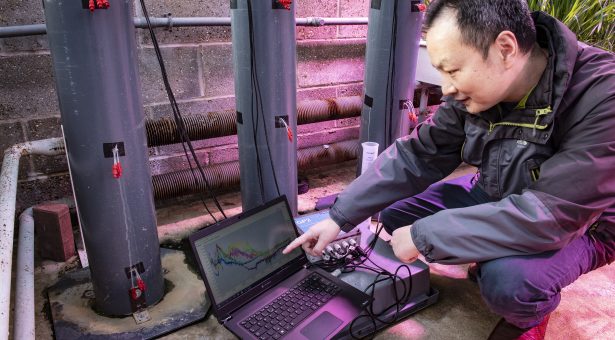Nitrogen Sensors for Optimising Crop Growth and Fertiliser Application

Nitrogen is an essential nutrient for crop growth, it is applied to crops to enhance their yield. If applied in excess and/or during extreme rainfall, nitrogen runs off into freshwater habitats such as rivers, causing pollution and impacting biodiversity.
Limiting the amount of fertiliser applied to soils, to match supply to the demands of the crop, is an important target for more sustainable agriculture. This type of ‘precision agriculture’ requires understanding how much nitrogen is available to crops within the soil.
As part of our research, we have developed soil sensors to monitor nitrogen content at different depths of the soil informing farmers and agronomists how much nitrogen is available to crops.
By understanding this we can enables optimal nitrogen application for crop growth, reducing the excesses which lead to pollution, thereby encouraging healthy soils and supporting healthy watercourses.
More efficient use of fertiliser saves money for farmers and benefits society by improving the environment.
The production of chemical fertiliser consumes large amounts of energy that currently adds to greenhouse gas emissions.
Our Research and Impact
Working with farmers, agronomists and agribusinesses we have developed sensors, suitable for a range of crops. The company Plenty Sense Ltd is anticipating that these will be made available to the market in 2025 where they will be used as a service.
- Plenty Sense Ltd are producing nitrogen sensors suitable for different crops including cereals, potatoes and onions. These sensors detect nitrogen at different depths to match the crop root depth.
- Fertilisers are expensive, by optimising the amount of nitrogen applied to a crop our sensors will reduce the input costs for farmers, while maximising yields and income.
- By measuring nitrogen at a range of soil depths, Plenty Sense sensors indicate when nitrogen applications have been washed too deep for crops to access.
- Some nitrogen fertilisers such as urea turn-over quickly in the soil, our sensors will allow farmers and agronomists to understand when the available nitrogen has become depleted.
- Different crop irrigation systems influence how quickly fertilisers are washed out of the soils. Plenty Sense sensors can be used to understand this and allow farmers to assess whether more expensive drip irrigation systems are economically viable.
- Some of the molecules used for the detection of crop nutrients are produced by soil microbes. As part of our ongoing research, we are screening natural products for better sensor molecules with improved selectivity.
